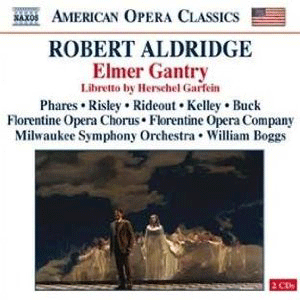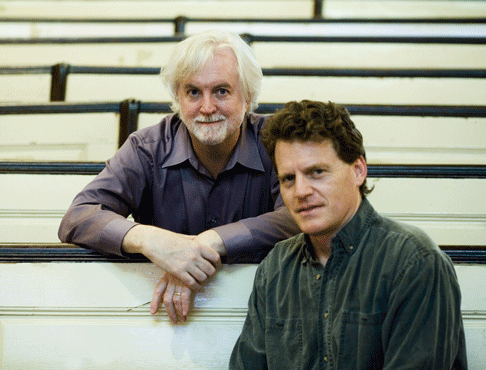
31 Mar 2012
Elmer Gantry the Opera
The novels of Sinclair Lewis once shot across the American literary skies like comets, alarming and fascinating readers of that era, but their tails didn’t extend far behind them.
English Touring Opera are delighted to announce a season of lyric monodramas to tour nationally from October to December. The season features music for solo singer and piano by Argento, Britten, Tippett and Shostakovich with a bold and inventive approach to making opera during social distancing.
This tenth of ten Live from London concerts was in fact a recorded live performance from California. It was no less enjoyable for that, and it was also uplifting to learn that this wasn’t in fact the ‘last’ LfL event that we will be able to enjoy, courtesy of VOCES8 and their fellow vocal ensembles (more below …).
Ever since Wigmore Hall announced their superb series of autumn concerts, all streamed live and available free of charge, I’d been looking forward to this song recital by Ian Bostridge and Imogen Cooper.
The Sixteen continues its exploration of Henry Purcell’s Welcome Songs for Charles II. As with Robert King’s pioneering Purcell series begun over thirty years ago for Hyperion, Harry Christophers is recording two Welcome Songs per disc.
Although Stile Antico’s programme article for their Live from London recital introduced their selection from the many treasures of the English Renaissance in the context of the theological debates and upheavals of the Tudor and Elizabethan years, their performance was more evocative of private chamber music than of public liturgy.
In February this year, Albanian soprano Ermonela Jaho made a highly lauded debut recital at Wigmore Hall - a concert which both celebrated Opera Rara’s 50th anniversary and honoured the career of the Italian soprano Rosina Storchio (1872-1945), the star of verismo who created the title roles in Leoncavallo’s La bohème and Zazà, Mascagni’s Lodoletta and Puccini’s Madama Butterfly.
Evidently, face masks don’t stifle appreciative “Bravo!”s. And, reducing audience numbers doesn’t lower the volume of such acclamations. For, the audience at Wigmore Hall gave soprano Elizabeth Llewellyn and pianist Simon Lepper a greatly deserved warm reception and hearty response following this lunchtime recital of late-Romantic song.
Collapsology. Or, perhaps we should use the French word ‘Collapsologie’ because this is a transdisciplinary idea pretty much advocated by a series of French theorists - and apparently, mostly French theorists. It in essence focuses on the imminent collapse of modern society and all its layers - a series of escalating crises on a global scale: environmental, economic, geopolitical, governmental; the list is extensive.
For this week’s Live from London vocal recital we moved from the home of VOCES8, St Anne and St Agnes in the City of London, to Kings Place, where The Sixteen - who have been associate artists at the venue for some time - presented a programme of music and words bound together by the theme of ‘reflection’.
'Such is your divine Disposation that both you excellently understand, and royally entertaine the Exercise of Musicke.’
Amongst an avalanche of new Mahler recordings appearing at the moment (Das Lied von der Erde seems to be the most favoured, with three) this 1991 Mahler Second from the 2nd Kassel MahlerFest is one of the more interesting releases.
‘And there was war in heaven: Michael and his angels fought against the dragon; and the dragon fought and his angels, And prevailed not; neither was their place found any more in heaven … that old serpent … Satan, which deceiveth the whole world: he was cast out into the earth, and his angels were cast out with him.’
If there is one myth, it seems believed by some people today, that probably needs shattering it is that post-war recordings or performances of Wagner operas were always of exceptional quality. This 1949 Hamburg Tristan und Isolde is one of those recordings - though quite who is to blame for its many problems takes quite some unearthing.
There was never any doubt that the fifth of the twelve Met Stars Live in Concert broadcasts was going to be a palpably intense and vivid event, as well as a musically stunning and theatrically enervating experience.
‘Love’ was the theme for this Live from London performance by Apollo5. Given the complexity and diversity of that human emotion, and Apollo5’s reputation for versatility and diverse repertoire, ranging from Renaissance choral music to jazz, from contemporary classical works to popular song, it was no surprise that their programme spanned 500 years and several musical styles.
The Academy of St Martin in the Fields have titled their autumn series of eight concerts - which are taking place at 5pm and 7.30pm on two Saturdays each month at their home venue in Trafalgar Square, and being filmed for streaming the following Thursday - ‘re:connect’.
The London Symphony Orchestra opened their Autumn 2020 season with a homage to Oliver Knussen, who died at the age of 66 in July 2018. The programme traced a national musical lineage through the twentieth century, from Britten to Knussen, on to Mark-Anthony Turnage, and entwining the LSO and Rattle too.
With the Live from London digital vocal festival entering the second half of the series, the festival’s host, VOCES8, returned to their home at St Annes and St Agnes in the City of London to present a sequence of ‘Choral Dances’ - vocal music inspired by dance, embracing diverse genres from the Renaissance madrigal to swing jazz.
Just a few unison string wriggles from the opening of Mozart’s overture to Le nozze di Figaro are enough to make any opera-lover perch on the edge of their seat, in excited anticipation of the drama in music to come, so there could be no other curtain-raiser for this Gala Concert at the Royal Opera House, the latest instalment from ‘their House’ to ‘our houses’.
"Before the ending of the day, creator of all things, we pray that, with your accustomed mercy, you may watch over us."

The novels of Sinclair Lewis once shot across the American literary skies like comets, alarming and fascinating readers of that era, but their tails didn’t extend far behind them.
His best novels came relatively early, a string of successes climaxing with the Nobel Prize for literature — the first won by an American — after Dodsworth. He continued to produce novels until his death a couple decades later; they are mostly forgotten, and even his best work merits little discussion today. His themes of the banality and hypocrisy of American middle class mores haven’t exactly lost their relevance, but they seem obvious and forced. It’s interesting that, according to Richard Dyer’s excellent booklet essay, the inspiration for composer Robert Aldridge and librettist Herschel Garfein’s operatic adaptation of Elmer Gantry came while watching the 1960 film version. The cinematic version, with its Academy Award-winning performance in the lead by Burt Lancaster, at least retains Technicolor vividness.
The story of Elmer Gantry has a picaresque quality, as we follow a brash young athlete who, almost by accident, finds himself on the path to becoming a successful Evangelist, all the while pursuing his own need for female companionship and ego-building applause. The rather labored ironic ending finds Gantry leaving behind, if not in the dust then in the ashes of a fire, those who had helped him reach his goals, and moving onto to a vaguely “New Age” type religious re-birth. In another booklet essay, Leann Davis Alspaugh quotes the great line from H. L. Mencken that “deep within the heart of every evangelist lies the wreck of a car salesman.” Those relatively few pithy words put across the thrust of Elmer Gantry, at least as an opera. Over two hours of accomplished, professional composition and literary adaptation belabors the point at excessive length.
However, there is much to commend in the work of Aldridge and Garfein. In particular, Aldridge finds ways to use creative orchestration to give momentum and a sense of variety to a score that mostly builds upon the comparatively unsophisticated sounds of gospel music. There are hints of Copland from time to time, or perhaps one of Virgil Thompson’s documentary film scores. The problem is that when it comes time for an aria, that inspiring breath of original melodic inspiration that is found in the great operas of the standard repertory evades Aldridge. Nevertheless, when a booklet essay writer notes that the opera has already found a niche for itself at American music colleges as a fine piece to stage for aspiring singers, it’s clear that the sheer craftsmanship of Elmer Gantry the opera has earned it a kind of success.
 Composer Robert Aldridge and librettist Herschel Garfein [Photo by Jane Kung]
Composer Robert Aldridge and librettist Herschel Garfein [Photo by Jane Kung]
The Naxos recording, made before an enthusiastic live audience, benefits from the strong leadership of conductor William Boggs over the Milwaukee Symphony Orchestra and the Florentine Opera Chorus. In the title role, Keith Phares offers the kind of smooth baritone reminiscent of Nathan Gunn — a handsome sound without much character. In the somewhat superfluous role of Gantry’s best friend Frank, Vale Rideout strains a bit at the high end. Patricia Risley sings the lead female role of Sister Falconer, a female evangelist who is actually more interesting as a character than Gantry. Like Phares, Risley’s seems to have adopted a vocal production arguably closer to Broadway than to an opera stage, and a little more thrust and edge would have been good. In the role of a pathetic husband that Gantry cuckolds, Frank Kelley gets a manic mad scene that should go over very well for budding character tenors looking for competition pieces in English.
Naxos manages to provide a slim booklet with informative essays, production stills, and the libretto in English. On the debit side, Naxos doesn’t provide much tracking, with the long act one, for example, on CD 1 with only 6 tracks. Although your reviewer will reserve judgment on whether Elmer Gantry the opera belongs in a CD series called “American Opera Classics,” it is an honest and finely assembled piece that makes a strong case for itself. The same cannot necessarily be said for many American operas of the last decades with higher profiles.
Chris Mullins
[Editor’s Note: Elmer Gantry received two Grammy Awards for Best Contemporary Classical Composition and Best Engineered Album, Classical at the 54th Annual Grammy Awards (2011)]